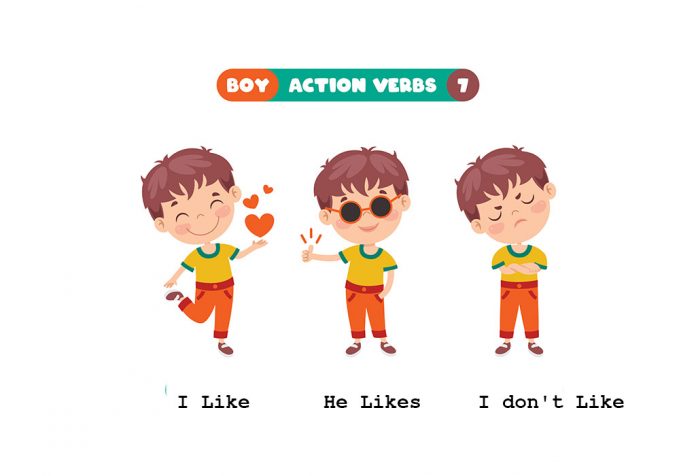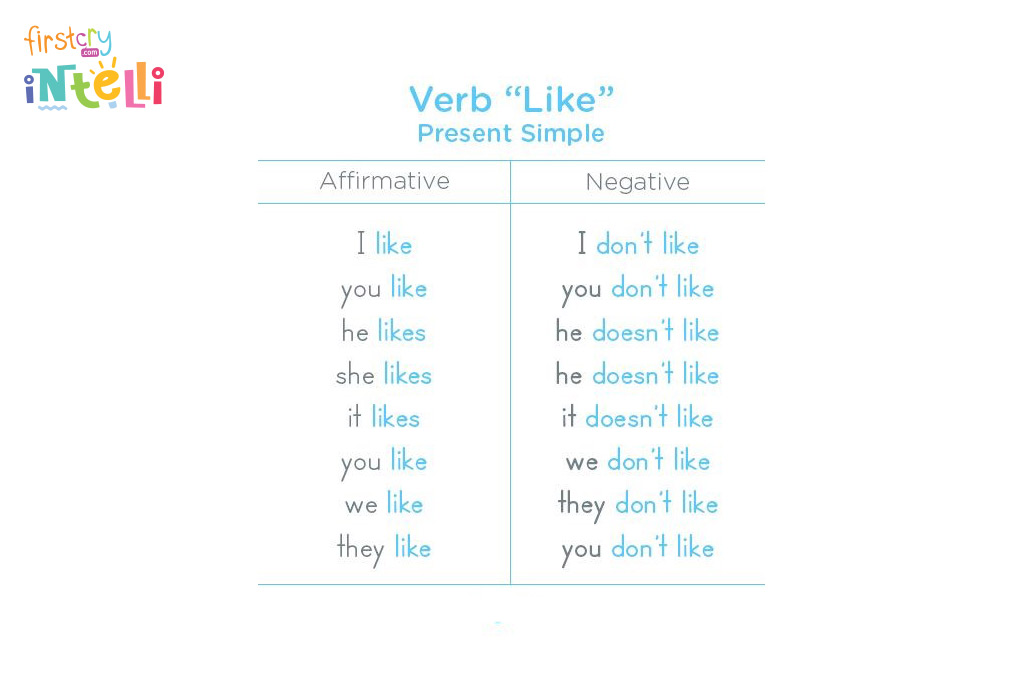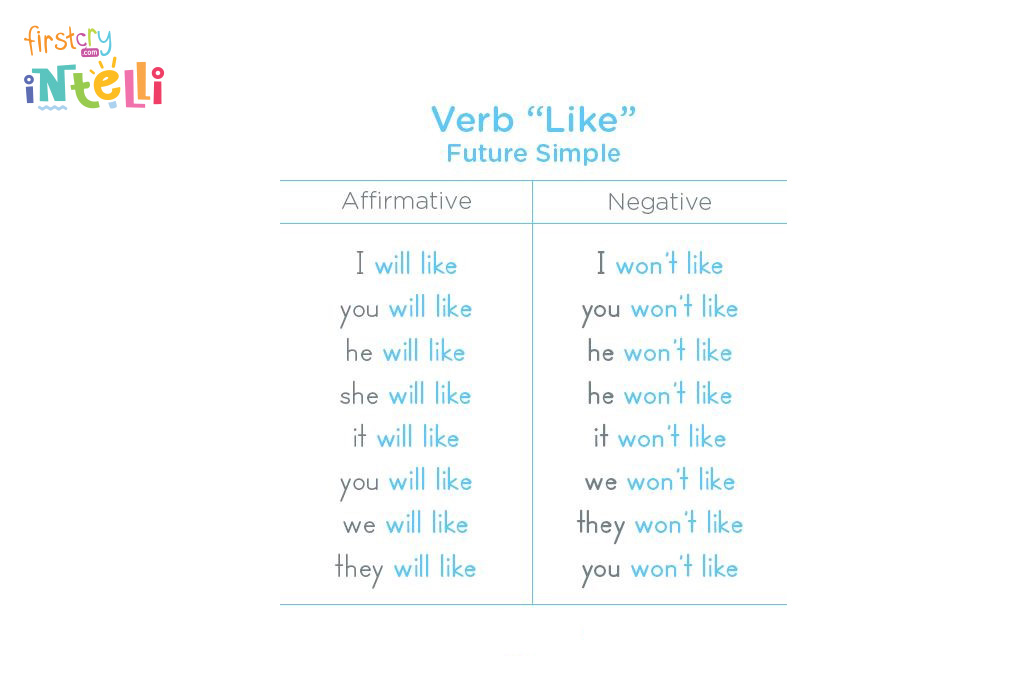Last Updated on December 17, 2022
Expressing l likes and dislikes for class 1, 2 and 3 kids is an important part of their day-to-day communication. From a young age, most children start recognising the things they enjoy and the ones they don’t, and as their speech develops, kids become eager to share this information with family and friends. The verb “like” is the one used for this purpose, and it’s also one of the most common verbs in English. Let us understand the verbs verb like and dislike in English for kids.
Thank you for reading this post, don't forget to subscribe!
What’s The Definition Of The Verb “Like”?
In English, the meaning of the verb “like” is similar to the verb “love” but the feeling is not as strong, it implies that the person enjoys something or that he or she has a positive feeling about it.
For example, “I like my new shoes.”, this implies that the subject enjoys the new shoes and feels positive about them. On the contrary, when it’s a negative sentence with the verb like, for example: “I don’t like summer”, it means that person doesn’t feel positive about summer but it’s not a strong feeling of dislike.
Importance Of Teaching Kids The Verb “Like”
Every sentence requires a verb to talk about the action taking place. Not all actions can be observed by the eye. The verb like denotes an action of feeling something, or expressing an opinion about a particular thing. Children should be taught how to use various forms of the verb like so that they can express themselves and communicate their feelings. While making choices, they will be able to say what they ‘like’. While receiving something, they will be able to express gratitude as they ‘like’ what they got. Most importantly, if they are in a situation that is not comfortable for them, they will be able to confidently say that they ‘dislike’ it. Thus, it is important to teach kids the verb ‘Like’ because:
- It enriches their personality
- Teaches them how to express gratitude
- Allows them to put words to their opinions
- Teaches them the concept of reviewing an object
- Improves their vocabulary and sentence construction
- Teaches them communication skills
Conjugation Of The Verb “Like” For Kids In English
The verb “like” is a regular verb, which means that its form does not change when used in different tenses. It can be written in the past tense by added ‘d’ and in future tense by adding ‘will’. The verb “like” always requires an object, which means that it has to be followed by a noun, gerund or pronoun.
In order to make a sentence with any form of the verb “like” the correct structure is to put the subject first, then the verb like, and then the thing that he or she likes (subject + like + object). For example: “I like water”, “I have a pen. I like it”.
Let us look at the forms of like and dislike with examples
Simple Present Tense Of The Verb “Like”
The present tense of “like” in the affirmative is very easy to write. Since it’s a regular verb, it doesn’t change much for the different pronouns in English, but must be written with an added ‘s’ when talking about the singular third person (he, she, it). The negative sentences with the verb “like” in Present Simple are formed adding don’t or doesn’t for singular third person.
- I like – I don’t like
- we like – we don’t like
- you like – you don’t like
- he/she/it likes – he/she/it doesn’t like
- they like – they don’t like
Present Tense Examples With The Verb “Like”
- I like cars. Can I get one for my birthday gift?
- We like this movie. We have seen it many times.
- You like pancakes, so I have brought some for you.
- Karan is very good at sports. He likes football.
- Nirali never watches movies. She likes cartoons.
- There is a lizard in my room. It likes crawling on the ceiling.
Many children have enrolled in the summer camp. They like dancing.
Past Tense Of The Verb “Like”
Given that “like” is a regular verb, its past is formed by adding the letter “-d” at the end of it. In the like past tense, this applies to all the forms, and all subjects. The negative of the verb “like” in Past Simple is formed by adding the word didn’t (verb “to do” in the past tense) before the word “like”.
- I liked – I didn’t like
- you liked – you didn’t like
- he/she/it liked – he/she/it didn’t like
- you liked – you didn’t like
- we liked – we didn’t like
- they liked – they didn’t like
Past Tense Examples With The Verb “Like”
- I liked your dress
- We liked the food at the new restaurant.
- You liked the song that was playing on the radio.
- She liked living with her grandmother.
- They had a cute dog. It liked licking everyone’s feet.
- They liked hanging out with us.
Future Tense Of The Verb “Like”
the future tense of the verb “like” is formed by adding the word “will” just before the verb “like” for affirmative sentences, and the word “won’t” for negative sentences. The form of the verb like in the future tense, remains the same for all the pronouns.
- I will like – I won’t like
- you will like – you won’t like
- he/she/it will like – he/she/it won’t like
- you will like – you won’t like
- we will like – we won’t like
- they will like – they won’t like
Future Tense Examples With The Verb “Like”
- I will like anything that you gift me.
- We will like having you over.
- You will like the cake my mother bakes.
- He will like icecream with chocolate sauce.
- She will like the new dress that you got her.
- Let’s get some food for the monkey. It will like bananas.
Questions With The Verb “Like”
Like most verbs in English, the questions with the verb “like” are constructed using the verb “to do” in English, with the words “do ” or “does ” for questions in present tenses or the word “did ” for questions in past.
- Do/ Don’t I like…? – Did/ didn’t I like…?
- Do/ Don’t you like…? – Did/ Didn’t you like…?
- Does/ doesn’t he/she/it like…? – Did/ Didn’t he/she/it like…?
- Do/ Don’t we like…? – Did/ Didn’t we like…?
- Do’ Don’t they like…? – Did/ Didn’t they like…?
Examples Of Questions With The Verb “Like”
- I vaguely remember eating this fruit. Did I like it?
- Do you like singing?
- Doesn’t she like math?
- Do they like travelling?
- It’s so wonderful that you have a dog. Does it like doing tricks?
Other Uses Of Word “Like”
Other than the three forms of the verb “Like”, you may come across the word in several different contexts. It may have different meanings and may not always play the role of a verb.
- Like as a preposition: A preposition is a word that comes before a noun or pronoun, and expressing a relation to another word or element in the sentence. In case of a preposition, the word ‘like’ denotes similarity between two things. Eg “This smells like roses”.
- Like as a suffix: A combination of letters that are added to another word to morph it into a complete word. When the suffix like it added to a word, it denotes a comparision. Eg. Instead of saying “like a ball” you can say, “This toy has a ball-like shape”.
- Like as a noun: In a casual form of language, Like can be used as a noun, most commonly used in plural form, to mean a list of things that a person likes. Eg. Instead of saying, “What all do you like?” you can phrase your sentence as, “Tell me your likes and dislikes”.
- Like as a conjunction: A conjunction is a word that connects two sentences to make it one complete sentence. When like is used as a conjunction, it connects the primary sentence to another as a form of drawing comparison. Eg. “No one can dance like she does”. In formal language, this use of like is not always considered correct and can be written in a crisper manner with the use of ‘as’.
We hope you enjoyed this important vocabulary and grammar lesson. Encourage your child to tell you all about their likes, and express their opinions on various things to practice the use of the verb like and dislike.
Also Read:
Modal Verbs for Children
Even Number for Kids
Pronouns for Kids to Improve Vocabulary














